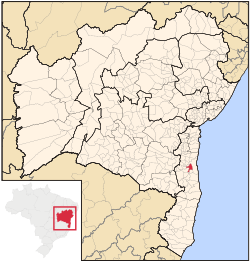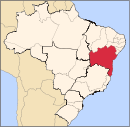Itabuna
Itabuna | |
|---|---|
Municipality | |
 Aerial view of Itabuna | |
 Flag  Seal | |
 Location of Itabuna in Bahia | |
 Itabuna Location of Itabuna in Bahia | |
| Coordinates: 14°47′09″S 39°16′48″W / 14.78583°S 39.28000°WCoordinates: 14°47′09″S 39°16′48″W / 14.78583°S 39.28000°W | |
| Country | Brazil |
| State | Bahia |
| Meso-region | Sul Baiano |
| Micro-Region | Ilhéus-Itabuna |
| Government | |
| • Mayor | Fernando Gomes Oliveira |
| Area | |
| • Total | 401 km2 (155 sq mi) |
| Population 2020 (est.) [1] | |
| • Total | 213,685 |
| • Density | 530/km2 (1,400/sq mi) |
| Demonym(s) | itabunense |
| Time zone | UTC−3 (BRT) |
| Postal code | 44300-xxx |
| Area code(s) | +55 73 |
| Website | itabuna |
Itabuna is a municipality in Bahia, Brazil. It is the 6th largest city in Bahia by population after Salvador, Feira de Santana, Camaçari, Vitória da Conquista, and Juazeiro. It had an estimated 213,685 residents in 2020. Itabuna covers a total area of 401 square kilometres (155 sq mi) and has a population density of 550 residents per square kilometer.[2]
History[]
The Portuguese arrived in the 16th century. The region was inhabited by the Tupiniquim, an indigenous group of the larger Tupi people. The Portuguese established the Captaincy of Ilhéus in the region, but it failed due to attacks by the nomadic Aimoré people, who emerged from the interior of Brazil in the 1550s. The region was populated by non-native Brazilians from 1867, mainly by migrants from Sergipe. Felix Severino de Oliveira, later known as Félix Severino do Amor Divino, and José Firmino Alves, his cousin, founded Fazenda Marimbeta, a farm, in the municipality. A street remains with the name in the Conceição of Itabuna. Itabuna was emancipated from Ilhéus in 1910. In 1978, the city became the seat of the Roman Catholic Diocese of Itabuna.[2]
Economy[]
Itabuna is a regional center of commerce, industry and services, along with its neighbour Ilhéus. Its economic importance grew during the golden era of cocoa cultivation. Thanks to its fertile soil, the city became the second biggest producer of cocoa in Brazil, exporting to the United States and Europe. After the devastation of crops caused by the fungus Crinipellis perniciosa (which causes a disease known as witch's broom), which led to a profound crisis in its economy, the city began to search a diversification of its economical activities. Nowadays, Itabuna is one of the most important trade points located along BR-101 Highway in Bahia.
Sport[]
Itabuna EC is the local association football team.
Notable people[]
- Jorge Amado, writer
- , snooker
- André Silva Carvalho, footballer
References[]
- ^ IBGE 2020
- ^ Jump up to: a b "Itabuna" (in Portuguese). Brasília, Brazil: Instituto Brasileiro de Geografia e Estatística (Brazilian Institute of Geography and Statistics). 2017. Retrieved 2017-07-20.
- Municipalities in Bahia
- Bahia geography stubs


